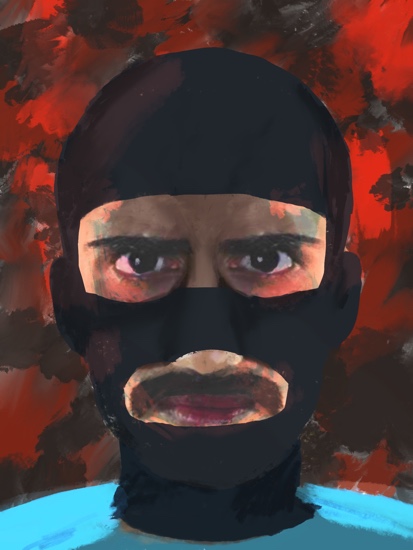An exciting thriller titled “Until Midnight” produced by the Emirati filmmaker Tariq Al Kazim was screened mid of June 2018 in the UAE. The film uses dialogues in English and Arabic. With a passion for filmmaking, Tariq talks about his anticipations for this film and how filmmakers can produce a film even on a tight limit.

- Tell us about your passion for film-making, when did that emerge and when did you decide to take it on a professional level?
Tariq Al Kazim: I have always been a lover of film my whole life. It was until 11th grade where I first came across a competition called “My film my story”. Through that, I found a love for filmmaking. By the 12th grade, I entered the Gulf Film Festival, a feat difficult to achieve considering I had no relevant education at the time. One of the major difficulties I faced was choosing between studying English literature or filmmaking. Even though I knew that I always wanted to tell my stories, I have realized that regardless, if I was a filmmaker or a writer, I am telling my stories, and since I had a love for cinema, and that financing does include scriptwriting, I thought “Why not?!”
- What is the one mistake which is made by most filmmakers, regardless of experience?
Tariq Al Kazim: They limit themselves. Most filmmakers believe that there are certain things needed to achieve something in a creative term. From my own experiences on set, the filmmakers (Scriptwriter and director to be more specific) emphasize this or that is not possible because of money or whatever reason. Most of the time, the budget is the killer of passion, since filmmakers believe that not much is possible through a limited budget. For instance, one of the reasons for creating “A Tale Of Shadows” was just that. I created a movie, taking place on a distant farm, with the most ridiculously low amount of budget of $20,000, and it succeeded. I wanted to tell filmmakers not to let anything stop them.
- How do you know when your story’s finished and when to walk away?
Tariq Al Kazim: Usually, a story is never finished with me. I constantly get this sense that the story could be better, but regarding how I make up my mind, it is usually with my team, they conclude by having no more comments on the script. Thus, I can only assume that they cannot find any loopholes or mistakes. From that point, we set a time to start shooting while I try to enhance the dialogue or actions and events, all the way until that point, where I stop with the script. As for the movie, during the post-production phase, when the final cut is ready, I may tweak it here and there, up to a certain point, then it’s up to the test audiences to check it out and from there, I fix it up until there seems to be a satisfaction from the audiences.

- Tell us about “Until Midnight” why this title?
Tariq Al Kazim: The reason I chose this title “Until Midnight” is mainly because the main character of the story who has until midnight to manage to contact his wife before she comes into the house with the killer around.
- What drew you to telling this story?
Tariq Al Kazim: Half of the time, what inspires me to write is when I question things. And in this case, I asked myself “What would I do if I found out that a killer is in the house, and I had to find a way out?”
- Tell us about some of the specific production challenges you faced while filming “Until Midnight” How big was your crew and how long did you film?
Tariq Al Kazim: It was difficult to handle the sleeping habits. Since the whole film was taking place during the nighttime, we had to switch from starting work at 6:00 pm until 06:00 AM. Also, we needed to work as silently as possible not to bother the neighbors living beside the villa. Lighting did pose an issue for us. The fact we had a small crew was indeed a tremendous downside considering that work had to be split up amongst us. It took us around a total of 8 months, excluding the script.
- How did you go about selecting the actors for this film, what were your preferences?
Tariq Al Kazim: I am a firm believer of a natural actor. To me, an actor who is natural is key, and there are very few natural actors these days. Perhaps one of the main reason is because I love giving an actor their freedom to express who their characters are. The one thing I try to avoid is having an actor come to me and ask what their character is.
- Briefly describe the appeal you believe your film shall have for audiences and why?
Tariq Al Kazim: I believe the main thing they will love is the twist. It surely will be unexpected as how the test audience has felt since they have constantly remarked how they did not expect that.
- What expectations do you have from this film and what do you think about the film industry in the U.A.E?
Tariq Al Kazim: I usually do not keep expectations in my mind as it normally affects how I narrate my story. However, I anticipate that filmmakers in the U.A.E could understand that anything is possible when you have the passion, and you will move forward with it. I guess the only expectation I have is knowing that audiences should appreciate and support the filmmakers here because it is not easy being a filmmaker here.
Regarding the industry in the U.A.E, I believe the industry is heading somewhere, but at a very slow pace. There’s all this boasting from the companies here that everything is going perfectly, but it’s not. There are still many issues around the industry that can be solved by harmless decisions. We have many talents who are not given the chance. I for one was amongst them, I have sent over scripts everywhere, almost every single type of genre and type throughout the years, but it’s always the same answer “We’re not looking for this type of genre” or “We’re not keen on this type of script”. I have gone as far as asking them what exactly they are looking for, but there was no reply, The biggest problem is that they don’t even know what they need, this pushed me to be independent of companies.
You hear all these stories about awards given to good contribution, success, etc. It’s almost none existent. Millions have been put into movies the past few years, yet, there’s what? Like 5-6 movies a year? Where is the budget going to? Also, the contribution is almost nonexistent when there are hundreds, barely getting jobs here.
When you see the support available from certain entities, it should help the budget tremendously, and an average drama movie can take about AED 1-2 million to create, but 10-20 is being spent on movies that has nothing special about them, and above that, places that are supposed to help with the local industry are pouring their millions into movies that are not local, why is that? It’s easy to be distracted away from the local filmmakers who are struggling. If this 10 million is split up, ten movies can be made; this does a lot more than meets the eye:
1- It expands the film industry through more movies being made (working on one that fails is worse than ten that may have some succeed)
2- It opens many chances for filmmakers to prove themselves (many are sitting and waiting for a miracle)
3- It opens many jobs for the struggling crew members (which is a major problem here)
4- It gives more chances for actors to have roles (which can help create celebrities)



